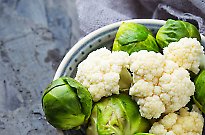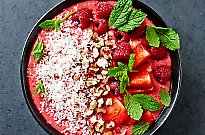
Make mine a happy meal

Are you looking for a feel-good meal other than the calorie-laden, comfort-food kind? Jennifer Kang investigates the belief that nutrient-rich foods on your plate can play a significant part in the path to happiness.
You can get a feel-good, energy-boosting hit from nutrients in healthy foods that work similarly to the way a mid-afternoon snack does.
COMFORT FOOD
Do you need a caffeine hit for the energy required to get you through the work day? Is a chocolate bar your antidote to 3.30-in-the-afternoon-itis? Or are chips your way of staving off stress? Living in a frenetic world, it’s little wonder we search for the instant pick-me-up in typical feel-good foods such as chocolate, cake and chips.
However, while occasionally resorting to guilty indulgences can be a legitimate way of coping, excessive consumption of sugar, saturated fats and caffeine can aggravate stress and decrease your potential for optimal wellbeing and happiness.
“These treat foods can certainly boost our mind and energy levels in the short-term, but before too long, we’ll come crashing back down,” explains author of the website healthandthecity.com.au and corporate health and wellness consultant, Caitlin Reid.
The good news is you can get a feel-good, energy-boosting hit from healthy nutrients that work similarly to the way a mid-afternoon snack does.
MIND FOOD SCIENCE
Research into the connection between food and brain chemistry has revealed what the health conscious have known for a long time – that eating healthy makes us feel good.
Just like any other organ in our body, our brain operates on the well-known philosophy that we are what we eat. Twenty per cent of the brain is ‘dry mass’ made up of the essential fatty acids – omega-3 and 6 – which come directly from the food we consume.
In addition, the different neurotransmitters – the chemicals that send information from one nerve cell to other nerves, muscles, or organs – are made up from different amino acids, many of which are directly derived from our diet.
“The saying, ‘you are what you eat’ definitely has merit. The food we put in our body controls our energy levels, mood and general feelings of health and wellbeing,” Reid says.
THE REAL HAPPY MEAL
Natural health expert Caroline Longmore, in her book The Serotonin Secret, claims foods that boost levels of serotonin – the feel-good chemical in the brain – together with an all-round healthy diet and moderate exercise, are crucial when it comes to achieving a balanced mind and body.
“Although it is becoming increasingly clear that healthy nutrition has a beneficial impact upon mental health and mood, we do not yet know if this effect is only due to the impact of diet upon serotonin or by other mechanisms as well,” Dr Craig Hassed of Monash University’s department of general practice says.
While researchers say it’s not a simple case of ‘eat and feel better’, they have revealed a sure connection that exists between certain nutrients and different states of mind.
“As an example, a recent Australian study reported in the Medical Journal of Australia, showed that adolescents eating a healthy, whole food diet were nearly half as likely to get depression as adolescents who ate a nutritionally poor diet with a lot of fast food and empty calories,” Dr Hassed says.
In her book, Dr Longmore explains a diet high in tryptophan – an amino acid converted by the body into serotonin – can improve mood and wellbeing. The best part is, most of these foods that can make us happy are delicious and nutritious, and in the long run, more feel-good than chocolate.
However, it’s not a simple case of eating tryptophan-rich foods to feel good. Other amino acids compete for absorption in the body and tryptophan frequently misses out. Combining tryptophan-rich foods with carbohydrates, however, maximises the potential for tryptophan absorption and consequently stimulates serotonin production.
Reid explains low GI ‘smart carbs’ such as wholegrain bread, pasta, oats, low-fat milk and yoghurt are particularly effective when it comes to boosting serotonin levels.
“When you eat carbohydrate-containing food, your body releases insulin, which helps to not only lower blood glucose levels, but also helps to clear the competing amino acids in your blood without having an effect on tryptophan," she says.
"And without the competing amino acids, tryptophan is free to enter the brain to make serotonin."
FEEL-GOOD EATING JUST GOT HEALTHY
Here are tryptophan-rich foods to include in your diet for healthier, feel-better eating:
Fruit
Dr Longmore recommends we eat between four and 11 bananas a week to increase happiness and maximise wellness. An excellent substitute for sugary comfort foods, bananas are a rich source of potassium and are high in amino acids, which trigger the body to produce the serotonin-stimulating tryptophan. Pineapple and avocado are high in B vitamins and folate and also trigger serotonin production.
Poultry
Turkey and chicken are good sources of tryptophan. Rich in protein, chicken and turkey are good sources of the mineral selenium – which is essential for hormone and immune function – and also contain the cancer-preventative B vitamin, niacin.
Dairy
Cottage cheese is particularly high in amino acids, which generates tryptophan. Rich in protein, selenium, calcium and vitamin B12 and low in fat, it’s a good all-rounder.
Rice
Essential in any tryptophan-rich diet, brown rice is a rich source of fibre and combined with other wholegrains, it can substantially lower the risk of heart disease, certain cancers and type 2 diabetes. Basmati and Doongara rice are also good sources of tryptophan, preventing blood-sugar fluctuations that can lead to mood imbalances.
Nuts and legumes
Brazil nuts are high in selenium and can combat thyroid problems, which can contribute to moodiness, anxiety and even depression. One to two Brazil nuts are all you need to meet your daily selenium intake requirements. Legumes such as kidney beans, chickpeas and soybeans help the body stabilise blood-sugar levels, which help maintain stable mood and temper.
HAPPY MEAL BONUSES
As well as tryptophan, omega-3s has been found to make a particular difference. Long been touted a mind-nourishing super nutrient, research has indicated people who eat more omega-3-rich foods such as oily fish, are less likely to be depressed.
In addition to deep-sea fish such as salmon and tuna, sea crustaceans such as lobster and prawns – which contain minerals such as zinc and magnesium as well as B vitamins – can help optimise the brain’s processes to help make you feel good.
Folic acid also appears to have a feel-good effect on the brain. By reducing levels of the amino-acid homocysteine, which is associated with depression and other health risks such as stroke and heart disease, it has also been related to increasing short-term memory and mental agility.
But should treats have a place in your happy meal plan? According to a 2007 Australian study, which found that a small piece of dark chocolate improved mood in 61 per cent of depressed people, an occasional piece of chocolate, it seems, deserves a spot in your feel-good diet.
Reid says according to popular belief, chocolate can stimulate the release of serotonin and endorphins in the body, which combine to produce a relaxed or euphoric feeling. But remember, its effects are only short-term. It’s the long term investment in healthy eating that makes for a real natural high.


